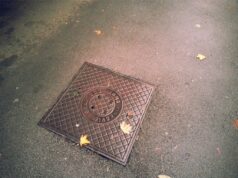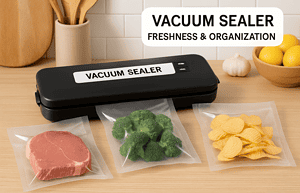
Looking for a way to keep your house healthy for decades?
It’s time to pay attention to the septic system.
1 in 5 homes in the US have a septic system instead of being connected to municipal sewer lines.
That means 1 in 5 homes like yours are running on a septic system just like yours.
Here’s the problem…
You don’t give your septic system a second thought. It works perfectly for years and years. Then one day – kaboom!
Your system fails.
You’re looking at thousands of dollars of repair costs.
Your guide includes:
- Why Your Septic System Needs To Be On Your Radar
- The Cost Of Cutting Corners On Maintenance
- Maintenance Habits To Keep Your System Happy
- 4 Septic System Warning Signs You Can’t Ignore
Why Your Septic System Needs To Be On Your Radar
Did you know your septic system processes every drop of wastewater that your house produces?
Shower? Check. Your septic system.
Laundry? Check. Your septic system.
Flush the toilet? Check. Your septic system.
Every day your septic system does the job without complaining.
Until it doesn’t.
It’s very similar to proper septic system design in Florida. If the system isn’t maintained properly, the soil can’t handle the waste and problems start to arise quickly.
Septic system maintenance is just as important in Florida as it is any other state. In fact, with the clay soil and water table fluctuations in Florida, septic system maintenance is especially important.
Your septic system is an investment in your home. You don’t want to mess around and potentially compromise its integrity by taking shortcuts or neglecting basic maintenance. The longer you take care of it, the longer it will take care of you.
Think about it:
Your septic system is literally filtering every drop of water your house produces. From showers to laundry to flushing the toilet, your septic system is hard at work.
The septic tank is the first stage. It’s a watertight container that holds all the wastewater from your house.
The solids in the wastewater settle to the bottom of the tank, while the liquid waste flows out through a system of pipes to the drain field.
The drain field is a series of perforated pipes buried underground. The liquid waste filters through the soil where microbes and bacteria break down any remaining contaminants.
There’s a good reason to pay attention to your septic system.
In fact, between 10% and 20% of all septic systems fail at some point during their lives.
That’s a lot of home-owners with failed septic systems.
The Cost Of Cutting Corners On Maintenance
It doesn’t have to be that way.
Let me show you how to keep your septic system in tip-top shape.
Your septic tank has a finite amount of space for holding all the wastewater your house produces.
If you don’t pump your septic tank regularly, the solid waste builds up and starts to migrate out into the drain field.
Once solids get into the drain field, it’s game over.
Your drain field will get clogged up.
Replacing a failed drain field can easily run you $10,000 or more. On the other hand, pumping a septic tank is a relatively simple job that costs around $550 on average.
Maintenance Habits To Keep Your System Happy
These habits are easy to follow.
Just remember…
Your septic system is a biological treatment process.
It relies on bacteria and microorganisms to break down waste and treat the wastewater your house produces. When you throw problems into the mix like flushing the wrong things down the toilet or overwhelming the system with water, you throw off the biological process. It won’t be able to treat your wastewater effectively.
Be mindful of what goes down your drains and toilets.
For example:
- Don’t pour grease or cooking oils down the sink or toilet. Grease can solidify and clog your septic system.
- Never flush diapers, sanitary napkins, feminine hygiene products, or paper towels down the toilet.
- Use normal cleaning products that are not too harsh or antibacterial.
- Only human waste and toilet paper should be flushed down the toilet.
Be smart about water usage in your house.
Too much water flooding the septic tank at once will not give solids time to settle to the bottom of the tank. The solids will flow out into the drain field and cause clogs.
Spread out your laundry loads over the course of the week. Fix leaky faucets and toilets. Install low-flow fixtures to reduce water usage.
Monitor water usage in your house. Try to stagger laundry loads and other water-heavy activities so that the septic tank isn’t overwhelmed with water.
Schedule regular inspections with a professional.
They will assess the overall condition of the system, looking for signs of leaks, evaluating the drain field performance, and ensuring that everything is functioning properly.
A professional will tell you the condition of your tank and let you know if it’s time to get it pumped. Pumping a tank removes the solid waste that builds up over time. Pump out your septic tank every 3 to 5 years.
The EPA recommends having your septic system inspected every 1 to 3 years and having your tank pumped every 3 to 5 years.
However, the actual frequency will depend on the size of your household, the size of your tank, and your water usage habits.
Talk to a septic professional to find out how often your system needs pumping and inspection.
4 Septic System Warning Signs You Can’t Ignore
If your septic system is in good working order, you don’t have to worry about anything else. Right?
Wrong.
Even a well-maintained system can run into problems.
Here are some warning signs that you shouldn’t ignore:
Slow drains throughout your home. If multiple drains are slow to drain, it’s not just a clogged drain pipe. That means solids have built up in your septic tank and have flowed into the drain field.
Strong sewer smells. Foul odors around your septic tank or drain field area.
Pooling water or soggy spots in your yard around the drain field.
Extra green grass growth over the drain field. If you notice the grass over the drain field is greener and lusher than the rest of your yard, it could be a sign that wastewater is flowing around the drain field instead of being properly treated and absorbed by the soil.
Notice any of these signs?
Don’t wait!
Call a professional right away.
Repairing a septic system once it’s failed is always more expensive than routine maintenance and pumping.
The Drain Field Dilemma
Your drain field is one of the most important parts of your septic system.
It’s responsible for the final treatment of the liquid waste that flows out of your septic tank. The liquid waste percolates through the soil where microbes and bacteria do the heavy lifting to treat the wastewater.
But when the drain field fails, you’ll know it.
You’ll have standing water or wet spots in the ground above the drain field. You might even notice extra lush, green grass growth above the drain field.
A drain field can fail for a number of reasons, including:
- Regular pumping of the septic tank is skipped.
- Too much water is put on the system at one time (heavy watering of lawns, multiple laundry loads all at once, etc.).
- Harsh chemicals kill the microbes and bacteria that are responsible for breaking down and treating the wastewater.
- The system is poorly designed or installed.
Maintaining the drain field will help keep your entire septic system healthy and functioning for many years to come.
The Bottom Line
Septic system maintenance isn’t hard.
But it does take effort and attention. If you’re willing to do a little bit of work to take care of your septic system, you can avoid major, expensive repairs and keep your septic system working for decades to come.
The average life of a septic system is 20 to 40 years. With proper care and maintenance, your septic system will last that long or longer.
Neglect your system, and you could be looking at expensive repairs or a completely failed septic system in a few years.
Septic system maintenance isn’t just important for the health of your system. It also protects the environment and keeps your family safe from contaminated water sources.








